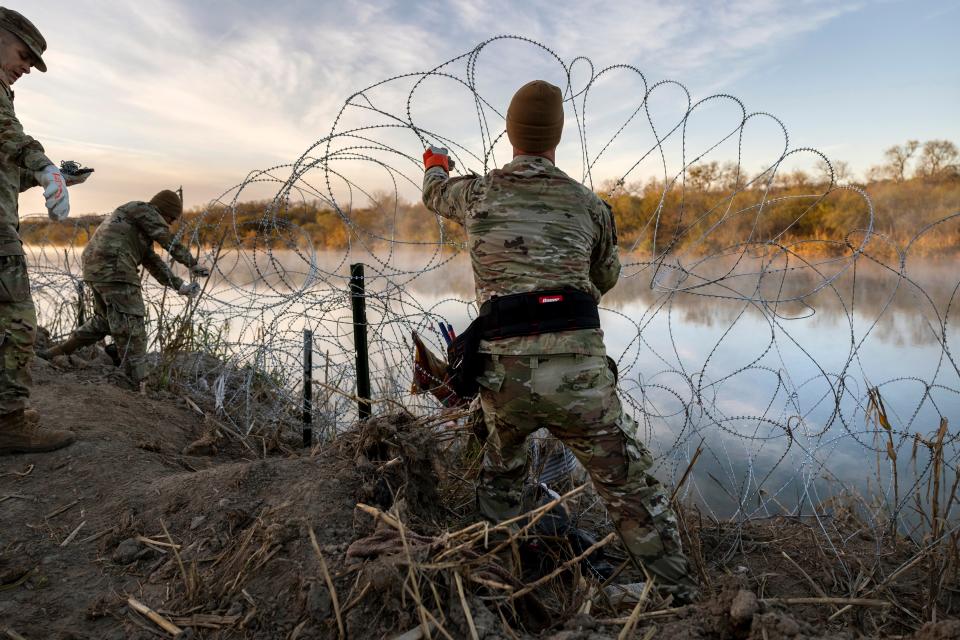Razor wire at the border: Supreme Court says feds can remove barriers in Texas meant to block migrants

WASHINGTON – The Supreme Court has allowed the Biden administration to remove razor wire barriers that Texas erected along a 29-mile stretch of the Rio Grande meant to block migrants at the Southwest border.
The 5-4 ruling Monday was a temporary victory for the Biden administration and gave the federal government the upper hand in its fight with Texas while the underlying lawsuit continues.
"Texas’ political stunts, like placing razor wire near the border, simply make it harder and more dangerous for frontline personnel to do their jobs," White House spokesperson Angelo Fernández Hernández said in a statement Monday.
Texas Gov. Greg Abbott, a Republican, authorized the installation of the razor wire as part of a broader effort to deter migrants from crossing the U.S. border from Mexico. That included a 29-mile stretch of the riverbank in Eagle Pass, much of which is private land.
More: Texas gov transforms immigration from a border issue to a backyard one. Dems aren't happy.
Texas razor wire holds back migrants ? and the Border Patrol
But the Department of Homeland Security argued that federal law gives Border Patrol agents authority to access private land within 25 miles of the border and that state laws cannot be used to stop those agents from carrying out their work.
The agency told the Supreme Court the razor wire is affecting migrants who have already entered the United States and making it harder for federal border agents to apprehend them.
“It is a foundational constitutional principle that the federal government is not bound by the laws or policies of any particular state in its enactment and implementation of federal law,” U.S. Solicitor General Elizabeth Prelogar told the court.
Texas Attorney General Ken Paxton said Monday that the destruction of Texas’ border barriers will not help enforce the law or keep Americans safe.
"This fight is not over, and I look forward to defending our state’s sovereignty," Paxton said in a statement.
Border security and the 2024 election
The fight over the barriers is part of a broader struggle between Abbott and President Joe Biden, a Democrat, over immigration. Biden is facing mounting pressure over the flood of migrants at the border – an issue his Republican challengers have been hammering on the campaign trail. Abbott also signed a law allowing state law enforcement officers to arrest, detain and deport people suspected of illegally crossing the border.
Siding with the administration were Chief Justice John Roberts and Justices Amy Coney Barrett, Ketanji Brown Jackson, Elena Kagan and Sonia Sotomayor. Those opposed were Justices Samuel Alito, Neil Gorsuch, Brett Kavanaugh and Clarence Thomas. None gave a reason for their vote.
More: New York City seeks $708 million from bus companies for transporting migrants from Texas

The administration's emergency appeal followed a ruling from the U.S. Court of Appeals for the 5th Circuit that sided with Texas, barring the federal government from removing the razor wire barriers except in cases of emergency, such as if a migrant is “drowning or suffering heat exhaustion.”
Migrant deaths and the Texas barrier
But the Justice Department told the Supreme Court this month that additional barriers the state erected had effectively prevented the Border Patrol from being able to determine whether a migrant in that area needed emergency aid.
Soon after that claim, a migrant woman and her two children died trying to cross the Rio Grande near a park in Eagle Pass where state officials have blocked access to federal Border Patrol officers. The park contains a staging area for the Border Patrol and the boat ramp from which patrol boats are launched.
Though it’s impossible to say what might have happened to the migrants if the Border Patrol had had access to the area, the federal officers would at least have been able “to take any available steps” to help Mexico’s rescue mission, the Justice Department told the Supreme Court last week.
More: Mexican family's death at border looms over ongoing Justice Department standoff with Texas
Texas authorities blamed the Biden administration for the three deaths, saying they happened because the U.S. has failed to properly enforce its immigration laws.
They also disputed the federal government’s account of what happened the night of the drownings when two other migrants were also in distress in the river. Texas lawyers said the federal government sought to blame the state “for a tragedy that had already occurred before any federal official even contacted Texas.”
More: Texas Gov. Greg Abbott denies he's advocating shooting migrants crossing Texas-Mexico border
Contributing: Eduardo Cuevas and Bart Jansen
This article originally appeared on USA TODAY: Supreme Court rules feds may cut razor wire Texas placed along border
Solve the daily Crossword

